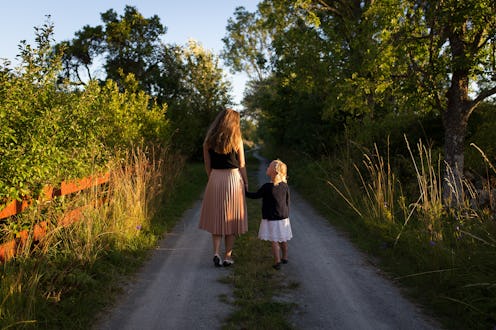
As a mother of two young children, my life is an extended study in worry. I worry about the people they'll grow up to become. I worry about how the world might bowl them over. And I worry about whether or not I'm choosing the right words to help shape them — which is why I try to actively engage in all the things feminist parents say to empower their kids. How we speak to our children is important, and imbuing them with empowerment now through the things we say will stick with them into adulthood. As a feminist, of course I want both of my children to feel empowered and believe in a world where limits are not tied to tired old gender tropes.
I think there have been many times in history where empowering children and validating their worth as humans independent of gender or race or religion has been especially significant. I believe we are in the midst of one of those times. Don't get me wrong — it has always been and always will be important to lift up your child with your words. But given our current political climate and the fact that so many marginalized groups' rights are being challenged daily, empowering our children to value themselves and each other is paramount right now.
With that being said, here are some powerful words feminist parents can use to empower their kids every day.
1. "You Can Do Anything You Set Your Mind To."
Not "You can do anything you set your mind to as long as it falls within the gender norms society ascribes to." When children are young and their brains are malleable, it's far easier to help them see their potential than when they are older and the world has told them far too often they have limitations... especially little girls, who often hear they aren't physically or mentally suited for a role or job based solely on their sex. A recent study, for example, found that girls start to think that boys are smarter as young as age 6. We have to do better than that.
2. "You Have a Choice."
Admittedly, these words can strike fear in even a feminist parent's heart when dealing with a headstrong four-year-old who won't eat their veggies at the dinner table. But, in general, it's a beautiful thing to say to your child — that they have a choice. That they have a say so in decisions regarding their own body and well-being, like whether or not they want someone else to hug them or whether they want to give Auntie Maude a kiss on the cheek. Because you know what? As they get older, they may have to fight against society for that same agency. Reinforce it now.
3. "Never Give Up."
Being a woman or gender non-conforming person in this world means meeting many roadblocks rooted in gender inequality. And being a feminist of any kind in this world means meeting a lot of resistance from less enlightened individuals (read: the patriarchy). But these three simple words, when spoken to your children, condition them to be persistent and to forge past any push-back. It reminds me of one of my most favorite quotes from feminist mom/author/blogger Jessica Kirkland: "As for my girls, I’ll raise them to think they breathe fire."
4. "You Are [Insert Praise Often Reserved for Boys]."
You are strong. You are brave. You are smart. You are courageous. You are powerful. You are funny. You are athletic. You are clever. You are bold. There are many ways little boys are typically described that little girls have historically not been. Little girls, as you well remember, are "sugar and spice and everything nice." They are "pretty" and "cute" and "beautiful." And while these things may all be true, little girls should also hear that they are also all those things people say their brothers are, too. Because, well, they are.
And while we're at it, don't forget that you can give boys praise for things that are typically coded as "feminine." Being, say, sensitive to someone else's needs doesn't have to be gendered anymore than being smart or courageous is. All of these things are valuable, and anyone can have these qualities.
5. "What Do You Think?"
It's a simple question, but it can have a big impact on your child's psyche. What do you think? Women aren't always given a chance to express their opinions. Our voices are often marginalized, and we are encouraged to be quieter and less outspoken. So by asking your children — boys and girls — what they think about something, you are demonstrating that their voices matter. Both of their perspectives are welcome at the proverbial table.
6. "I Believe in You."
While the phrases we've discussed up to this point encourage your kids to believe in themselves, this one leaves no doubt that you explicitly believe in them too. This is important. There will be moments when their self-confidence wavers, but if it is bolstered by your belief in them, they can draw strength from the fact that your faith in them is immutable.
7. "You Are Enough."
Without any adornments or degrees or accolades. Without validation from society or changing in any way. You are enough . Let these be the words that your kids repeat in their minds like a mantra long after they've left the safety and comfort of your nook. Our daughters especially will hear over and over again throughout the course of their lives that they should be me more or less something: more ladylike, less brash, more fit, less frumpy. But if you build a foundation of empowerment from these words, the hope is that they will shake off such insistences and expectations and know, without a doubt, that they are enough... just as they are.
Images: unsplash.com/Pexels; Giphy (7)